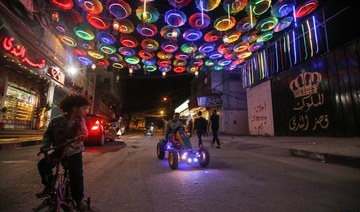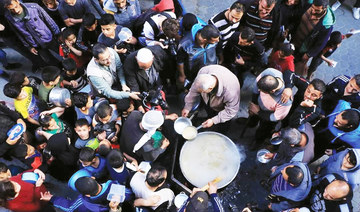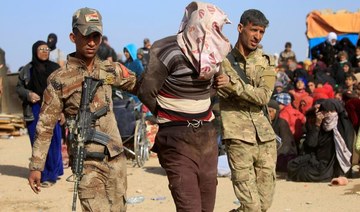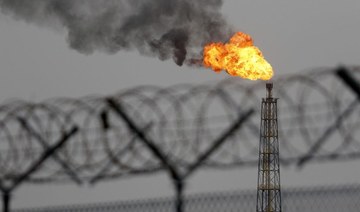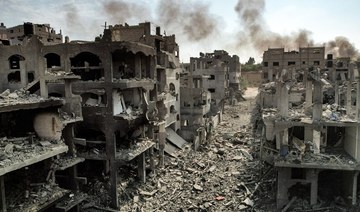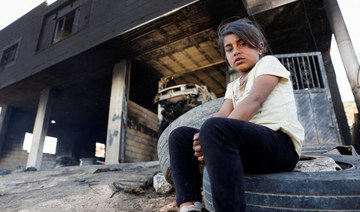GAZA: The sick and dying are rapidly pushing Gaza’s hospitals close to capacity amid a surge in COVID-19 cases in the impoverished Palestinian territory, health officials said.
Palestinians fear a combination of poverty, medical shortages, vaccine skepticism, poor COVID-19 data and mass gatherings during Ramadan could accelerate the increase, which began before the start of the holy month on April 13.
Gaza health officials said around 70 percent of intensive care unit beds were occupied, up from 37 percent at the end of March. There were 86 deaths over the past six days, an increase of 43 percent over the week before.
“The hospitals are almost at full capacity. They’re not quite there yet, but severe and critical cases have increased significantly in the last three weeks, which is a concern,” said Dr. Ayadil Saparbekov, head of the World Health Organization’s Health Emergencies Team in the Palestinian Territories.
Gaza’s daily positivity rate reached as high as 43 percent this week, although Saparbekov said that number could be inflated because a shortage of tests meant they were mostly given to people already showing symptoms.
Saparbekov also said Gaza does not have the capacity to identify highly infectious COVID-19 variants when testing, meaning there is little data on them.
Graveyards are also feeling the strain. In Gaza City, gravedigger Mohammed Al-Haresh said he had been burying up to 10 COVID-19 victims per day, up from one or two a month ago.
“Wartime was difficult, but the coronavirus has been much harder for us,” said Haresh, who dug graves throughout the 2014 Israel-Gaza war.
“In war, we would dig graves or bury the dead during a truce or ceasefire. With the coronavirus, there is no truce.”
Densely populated and home to 2 million Palestinians, Gaza has for years had limited access to the outside world because of a blockade led by Israel and supported by Egypt.
Both countries cite security concerns over Hamas, saying they want to stop money and weapons entering.
Palestinians say the blockade amounts to collective punishment and that it has crippled Gaza’s economy and medical infrastructure, with shortages of critical supplies and equipment hampering their ability to tackle the pandemic.
The situation in Gaza is a stark contrast to Israel, where a world-beating vaccination rollout has led to more than 53 percent of Israelis being fully vaccinated.
Amid growing concern, Hamas was set to begin a week of nightly curfews, shutting down mosques that host hundreds of worshippers for Ramadan evening prayers.
But with around 49 percent of Gazans unemployed and parliamentary elections slated for May 22, Hamas has held back from more drastic measures that could further damage the economy.
“We may impose additional measures, but we do not expect at this phase to go into a full lockdown,” Hamas spokesman Eyad Al-Bozom said.
Health officials say the factors that led to the current spike include the flouting of guidelines for mask-wearing and social distancing and the opening in February of Gaza’s border with Egypt, which may have allowed in new variants.
Suspicion of vaccines also runs deep. A majority of Gazans — 54.2 percent — said they would not take the vaccine, against 30.5 percent who said they would and 15.3 percent who were undecided, according to an April 21 survey by the Jerusalem Media and Communications Center.
Just 34,287 people have been vaccinated, even though the enclave has received 109,600 doses since February donated by Russia, the UAE and the global COVAX program.
“(The) reluctance of many, including medical staff, to be vaccinated remains a key concern,” the UN Office for the Coordination of Humanitarian Affairs said in an April 12 report.
One Palestinian eligible for Gaza’s initial round of vaccines, Qasem Abdul Ghafoor, said he decided to get the jab to protect himself and his family.
“The situation here is horrific. We took it lightly before, but I assure you, it should not be taken lightly,” he said.
Gaza gravediggers and medics stretched as COVID-19 spikes
https://arab.news/bwk9t
Gaza gravediggers and medics stretched as COVID-19 spikes
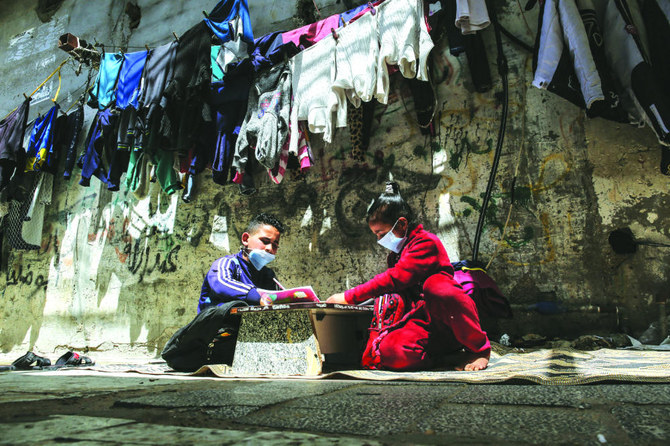
Iraq hangs 11 convicted of ‘terrorism’: security, health sources
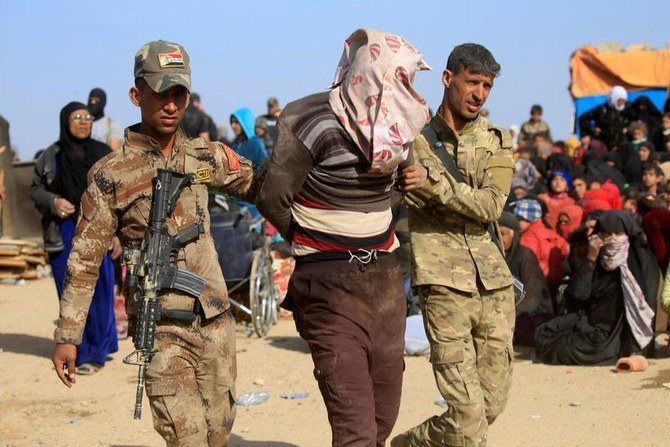
- Under Iraqi law, terrorism and murder offenses are punishable by death, and execution decrees must be signed by the president
- A security source in Iraq’s southern Dhi Qar province told AFP that 11 “terrorists from the Daesh group” were executed by hanging at a prison in Nasiriyah
NASIRIYAH, Iraq: Iraqi authorities have executed at least 11 people convicted of “terrorism” this week, security and health sources said Wednesday, with rights group Amnesty International condemning an “alarming lack of transparency.”
Under Iraqi law, terrorism and murder offenses are punishable by death, and execution decrees must be signed by the president.
A security source in Iraq’s southern Dhi Qar province told AFP that 11 “terrorists from the Daesh group” were executed by hanging at a prison in the city of Nasiriyah, “under the supervision of a justice ministry team.”
A local medical source confirmed that the health department had received the bodies of 11 executed people.
They were hanged on Monday “under Article 4 of the anti-terrorism law,” the source added, requesting anonymity due to the sensitivity of the issue.
All 11 were from Salahaddin province and the bodies of seven had been returned to their families, the medical official said.
Iraqi courts have handed down hundreds of death and life sentences in recent years for people convicted of membership in “a terrorist group,” an offense that carries capital punishment regardless of whether the defendant had been an active fighter.
Iraq has been criticized for trials denounced by rights groups as hasty, with confessions sometimes obtained under torture.
Amnesty in a statement on Wednesday condemned the latest hangings for “overly broad and vague terrorism charges.”
It said a total of 13 men were executed on Monday, including 11 who had been “convicted on the basis of their affiliation to the so-called Daesh armed group.”
The two others, arrested in 2008, “were convicted of terrorism-related offenses under the Penal Code after a grossly unfair trial,” Amnesty said citing their lawyer.
Biden says Israel must allow aid to Palestinians ‘without delay’
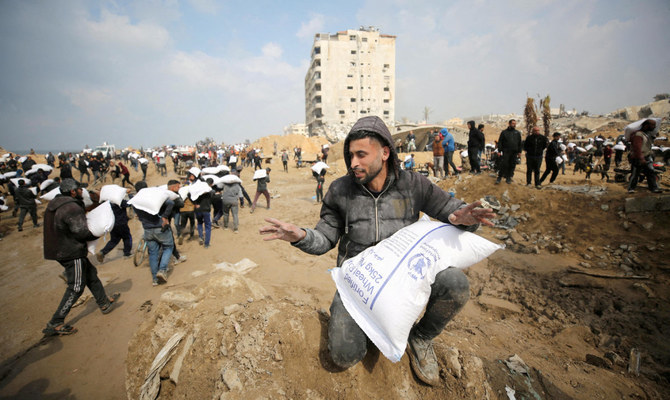
- “We’re going to immediately secure that aid and surge it,” Biden said
- “Israel must make sure all this aid reaches the Palestinians in Gaza without delay“
WASHINGTON: President Joe Biden on Wednesday demanded that new humanitarian aid be allowed to immediately reach Palestinians in the Gaza Strip as key US ally Israel fights Hamas there.
“We’re going to immediately secure that aid and surge it... including food, medical supplies, clean water,” Biden said after signing a massive military aid bill for Israel and Ukraine, which also included $1 billion in humanitarian aid for Gaza.
“Israel must make sure all this aid reaches the Palestinians in Gaza without delay,” he said.
US-Israel relations have been strained by Israel’s conduct of the war in Gaza and Israeli Prime Minister Benjamin Netanyahu’s plan to send troops into the southern Gazan city of Rafah, where 1.5 million people are sheltering, many in makeshift encampments.
“This bill significantly — significantly — increases humanitarian assistance we’re sending to the innocent people of Gaza who are suffering badly,” Biden said.
“They’re suffering the consequences of this war that Hamas started, and we’ve been working intently for months to get as much aid to Gaza as possible.”
Israel hits Lebanese border towns with 14 missiles
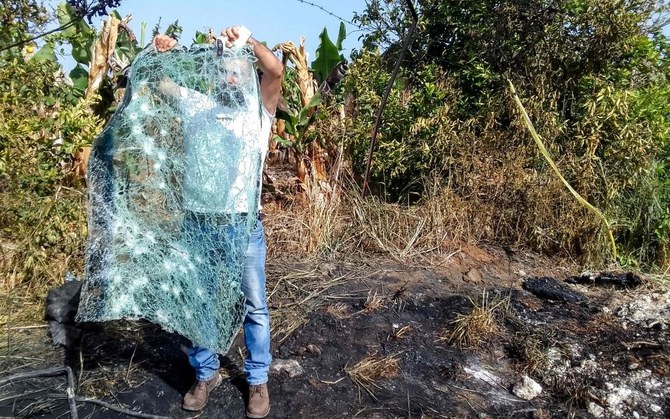
- Hezbollah targets Israeli settlements in retaliation for Hanin civilian deaths
- Hezbollah said it attacked the Shomera settlement with dozens of Katyusha rockets
BEIRUT: Clashes between Hezbollah and Israeli forces escalated sharply on Wednesday, the 200th day of conflict in southern Lebanon’s border area.
Israeli airstrikes created a ring of fire around Lebanese border towns, with at least 14 missiles hitting the area.
In the past two days, military activity in the border region has increased, with Hezbollah targeting areas in northern Acre for the first time in the conflict.
On Wednesday, Israeli strikes hit the outskirts of Aita Al-Shaab, Ramya, Jabal Balat, and Khallet Warda.
The Israeli military said it had destroyed a missile launching pad in Tair Harfa, and targeted Hezbollah infrastructure in Marqaba and Aita Al-Shaab.
Israeli artillery also struck areas of Kafar Shuba and Shehin “to eliminate a potential threat.”
Hezbollah also stepped up its operations, saying this was in retaliation for the “horrific massacre committed by the Israeli enemy in the town of Hanin, causing casualties and injuries among innocent civilians.”
A woman in her 50s and a 12-year-old girl, both members of the same family, were killed in the Israeli airstrike. Six other people were injured.
Hezbollah said it attacked the Shomera settlement with dozens of Katyusha rockets.
The group said it also targeted Israeli troops in Horsh Natawa, and struck the Al-Raheb site with artillery.
It also claimed to have killed and wounded Israeli soldiers in an attack on the Avivim settlement.
Israeli news outlets said that a rocket-propelled grenade hit a house in the settlement, setting the dwelling ablaze.
Hezbollah’s military media said that in the past 200 days of fighting with Israel, 1,998 operations had been carried out from Lebanon, Yemen and Iraq, including 1,637 staged by Hezbollah.
Egypt denies any discussions with Israel over Rafah offensive
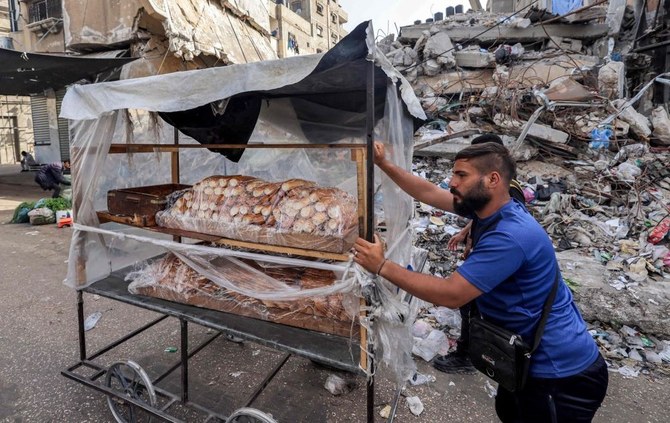
- Egypt reiterates opposition to any move on Rafah
- Warnings tell of expected losses and negative repercussions
CAIRO: Egypt has denied any discussions with Israel regarding an offensive in the Palestinian city of Rafah in the southern Gaza Strip.
Diaa Rashwan, the head of Egypt’s State Information Service, has refuted what has been claimed in one of the major American newspapers: that Egypt has discussed with the Israeli side its plans for an offensive in Rafah.
Rashwan has affirmed the Egyptian stance — announced several times by its political leadership — of complete opposition to the operation, which it is thought will lead to further massacres, massive human losses, and widespread destruction.
He added that Egypt’s repeated warnings have reached the Israeli side, from all channels, since Israel proposed carrying out a military operation in Rafah. These warnings tell of expected losses and the negative repercussions on the stability of the entire region.
Rashwan added that while Israel is contemplating its operation — which Egypt and most of the world and its international institutions stand against — Egyptian efforts since the beginning of the Israeli aggression had focused on reaching a ceasefire agreement and the exchange of prisoners and detainees.
He said Egypt was seeking the entry of humanitarian aid into the Gaza Strip, especially the north and Gaza City, and the evacuation of wounded and sick people for treatment outside the area.
Egypt has repeatedly opposed the displacement of Palestinians from Gaza and is warning against any military operation in Rafah.
UAE announces $544m for repairs after record rains
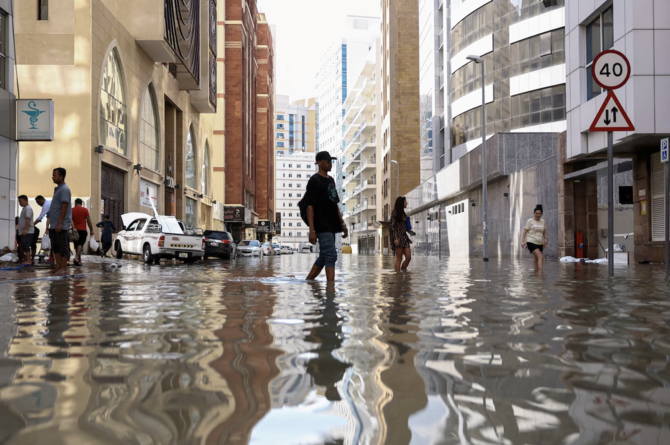
- Wednesday's announcement comes more than a week after the unprecedented deluge lashed the desert country
- “The situation was unprecedented in its severity but we are a country that learns from every experience,” Sheikh Mohammed said
DUBAI: The United Arab Emirates announced $544 million to repair the homes of Emirati families on Wednesday after last week’s record rains caused widespread flooding and brought the Gulf state to a standstill.
“We learned great lessons in dealing with severe rains,” said Prime Minister Sheikh Mohammed bin Rashid Al-Maktoum after a cabinet meeting, adding that ministers approved “two billion dirhams to deal with damage to the homes of citizens.”
Wednesday’s announcement comes more than a week after the unprecedented deluge lashed the desert country, where it turned streets into rivers and hobbled Dubai airport, the world’s busiest for international passengers.
“A ministerial committee was assigned to follow up on this file... and disburse compensation in cooperation with the rest of the federal and local authorities,” said Sheikh Mohammed, who is also the ruler of Dubai, which was one of the worst hit of the UAE’s seven sheikhdoms.
The rainfall was the UAE’s heaviest since records began 75 years ago.
Cabinet ministers also formed a second committee to log infrastructure damage and propose solutions, Sheikh Mohammed said in a post on X, formerly Twitter.
“The situation was unprecedented in its severity but we are a country that learns from every experience,” he said.
The storm, which dumped up to two years’ worth of rain on the UAE, had subsided by last Wednesday.
But Dubai faced severe disruption for days later, with water-clogged roads and flooded homes.
Dubai airport canceled 2,155 flights, diverted 115 and did not return to full capacity until Tuesday.



